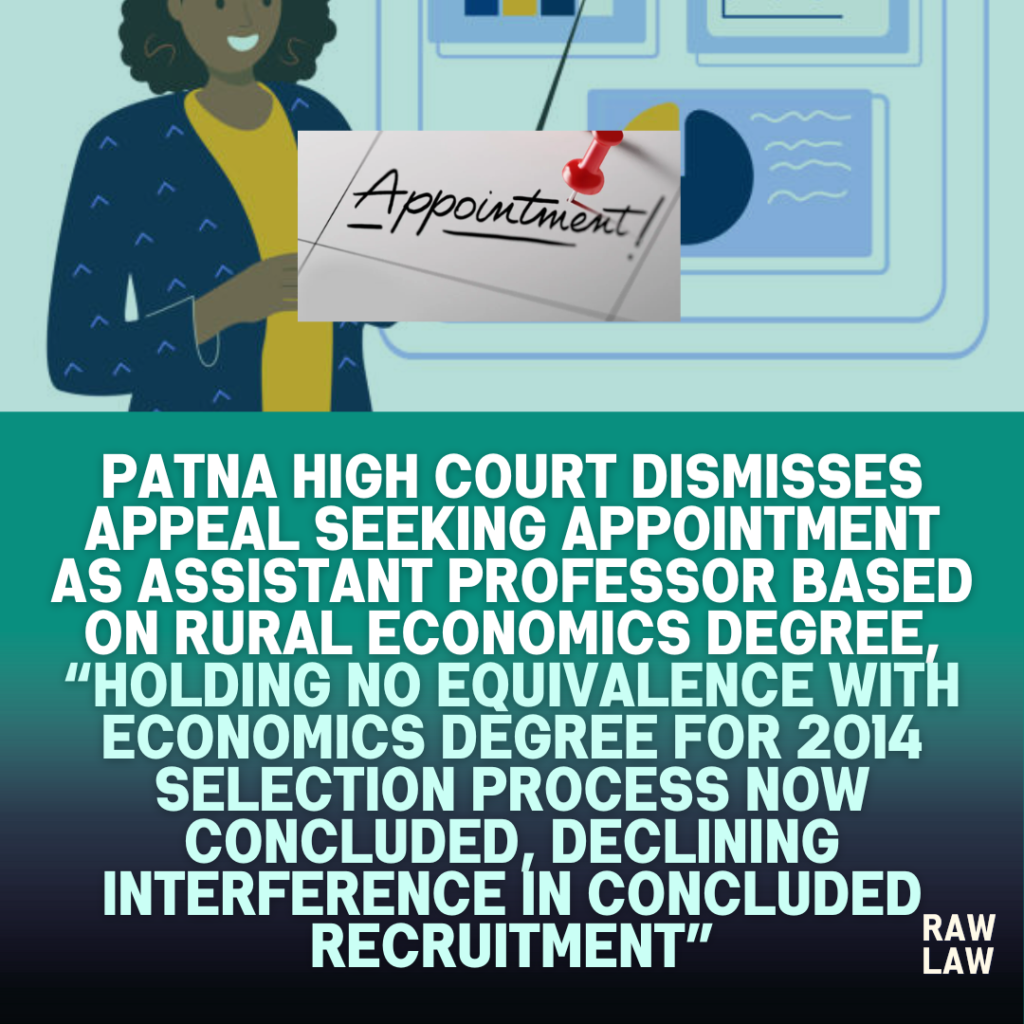Court’s Decision
The Patna High Court dismissed the Letters Patent Appeal challenging the Single Judge’s order rejecting the appellant’s writ petition seeking consideration for appointment to the post of Assistant Professor in Economics under the 2014 selection process. The Court held that there was no basis to interfere with the Single Judge’s judgment, as the selection process concluded in 2017, the Public Service Commission had been replaced by the University Service Commission, and the appellant’s qualification in Rural Economics was not equivalent to Economics for the purpose of the recruitment.
Facts
The appellant applied for the post of Assistant Professor in Economics under a recruitment process initiated by the Bihar Public Service Commission in 2014. The appellant possessed a Master’s degree in Rural Economics and had cleared the B.E.T. examination with Rural Economics as his subject. His candidature was rejected on the ground that a Master’s degree in Rural Economics was not equivalent to a Master’s degree in Economics, which was the required qualification for the post. The appellant argued that, post the Agrawal Commission Report, M.A. in Rural Economics should be treated as akin to M.A. in Economics, and the rejection of his candidature was unjustified.
Issues
- Whether a Master’s degree in Rural Economics is equivalent to a Master’s degree in Economics for the purpose of appointment as Assistant Professor in Economics.
- Whether the High Court should interfere with a concluded selection process initiated in 2014 and concluded in 2017.
Petitioner’s Arguments
The appellant contended that the Agrawal Commission Report clarified the equivalence of M.A. in Rural Economics with M.A. in Economics and that his qualification should have been accepted for the post of Assistant Professor in Economics. He argued that the authorities had acted arbitrarily in rejecting his candidature solely on the ground of nomenclature, despite his qualifications and subject knowledge in Rural Economics aligning with the requirements of the post.
Respondent’s Arguments
The respondents argued that the recruitment process initiated in 2014 concluded in 2017, and the appellant’s qualification did not meet the explicit eligibility criteria of possessing a Master’s degree in Economics. It was submitted that Rural Economics and Economics are distinct subjects, and the appellant’s reliance on the Agrawal Commission Report did not translate into an enforceable right in the recruitment process that had concluded. The respondents further pointed out that the Bihar Public Service Commission had since been replaced by the University Service Commission, making the prayer for appointment under the old selection process infructuous.
Analysis of the Law
The Court analysed the principles relating to judicial interference in concluded selection processes, reiterating that courts do not interfere in recruitment matters after the selection process has concluded unless there is a clear violation of statutory provisions or malafide action. It also emphasised that equivalence of qualifications must be explicitly recognised by the appointing authority and cannot be assumed based on broad academic recommendations, particularly in specialised appointments such as Assistant Professors in specific disciplines.
Precedent Analysis
The judgment did not cite specific precedents but applied the settled principles that:
- Courts refrain from interfering in concluded selection processes unless clear illegality is demonstrated.
- Equivalence of qualifications must be recognised by the appointing authority or through statutory notifications to be enforceable in recruitment matters.
These principles guided the Court’s decision to dismiss the appeal.
Court’s Reasoning
The Court noted that:
- The recruitment process initiated in 2014 concluded in 2017, and the appellant sought intervention long after its conclusion.
- The appellant’s qualification in Rural Economics was not recognised as equivalent to Economics by the recruiting authority for the purpose of the post.
- Even if the Agrawal Commission Report indicated similarities between Rural Economics and Economics, it did not grant the appellant an enforceable right for consideration in the completed recruitment process.
- The appellant’s grievance, while understandable, could not form the basis for judicial interference in a concluded selection process.
Conclusion
The Patna High Court dismissed the Letters Patent Appeal, affirming the Single Judge’s judgment that declined interference in the concluded 2014 recruitment process for the post of Assistant Professor in Economics. The appellant’s prayer for appointment based on a Rural Economics degree was rejected, with the Court noting the absence of recognised equivalence and the impracticality of reopening the concluded selection process.
Implications
- Reaffirms that courts will not reopen concluded selection processes unless there is proven illegality.
- Clarifies that equivalence of qualifications for recruitment must be formally recognised by the appointing authorities.
- Highlights the need for clear eligibility criteria and timely challenges in recruitment disputes.
Brief on Cases Referred
The judgment did not cite specific cases but applied:
- Principles on non-interference in concluded recruitment processes unless clear illegality is shown.
- Requirements for formal recognition of equivalence in qualifications for appointments in higher education.
FAQs
1. Can a degree in Rural Economics be considered equivalent to Economics for appointment as Assistant Professor in Economics?
No, unless the appointing authority explicitly recognises the equivalence, a degree in Rural Economics is not treated as equivalent to Economics for recruitment.
2. Will the High Court interfere in a concluded recruitment process after several years?
No, courts generally do not interfere in concluded selection processes unless there is a clear illegality or violation of statutory provisions.
3. What should candidates do if they believe their qualification should be treated as equivalent?
They should seek formal recognition from the appointing authority or challenge the eligibility criteria promptly during the recruitment process, not after its conclusion.



